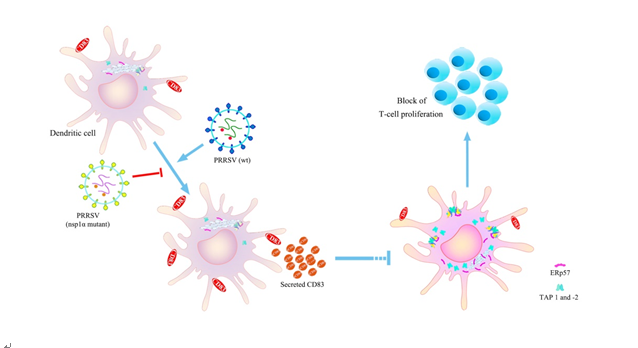At the end of May 2018, the international authoritative Journal of Virology published online a breakthrough made by Prof. Jiang Ping team, Nanjing Agricultural University, in the field of Porcine Reproductive and Respiratory Syndrome Virus (PRRSV) under the title of Nsp1α of PRRSV strain BB0907 impairs the function of monocyte-derived dendritic cells via the release of soluble CD83. Dr. Chen Ping of the team is the first author and Prof. Jiang is the correspondence author.
PRRSV is an important pathogen that harms the global pig industry, and the pathogenesis is still not fully understood. Under the support of the National Natural Science Foundation of China and other programs, the research team has found that monocyte-derived dendritic cells (MoDCs) infect by PRRSV significantly inhibiting antigen presentation of MoDCs and T cell proliferation by inducing protein CD83 (sCD83). It is shown for the first time that the zinc finger motif of PRRSV Nsp1α is closely related to the activation of CD83, and is a key functional region for the virus to suppress immunity by sCD83 which is induced by MoDCs. This finding further enriches the theoretical basis of PRRSV immunosuppression and is instructive in the study of PRRSV
Previously, the team member Ph.D. candidate Chen Xi found that PRRSV protein N and protein Nsp10 induce sCD83 expression and secretion through the SP1 and NF-κB signaling pathways, and published the finding in Journal of Virology. Up to now, the team has published over 110 research papers related to PRRSV, including 41 SCI papers. The PRRSV live vaccine (R98 strain) developed has been into industrial production and has played an important role in prevention and control of this disease in China.

Schematic diagram of the mechanism of PRRSV-mediated immunosuppression by sCD83
The abstract of the paper published in Journal of Virology on May 23, 2018. pii: JVI.00366-18, is as follows:
Abstract:Porcine reproductive and respiratory syndrome virus (PRRSV), a virulent pathogen of swine, suppresses the innate immune response and induces persistent infection. One mechanism used by viruses to evade the immune system is to cripple the antigen processing machinery in monocyte-derived dendritic cells(MoDCs). In this study, we show that MoDCs infected by PRRSV express lower levels of the MHC-peptide complex proteins TAP1 and ERp57, are impaired in their ability to stimulate T cell proliferation, and increase their production of CD83.Neutralization of sCD83 removes the inhibitory effects of PRRSV on MoDCs. When MoDCs are incubated with exogenously added sCD83 protein, TAP1 and ERp57 expression decreases and T lymphocyte activation is impaired.PRRSV non-structural protein 1α (Nsp1α) enhances CD83 promoter activity. Mutations in the ZF domain of Nsp1α abolish its ability to activate the CD83 promoter. We generated recombinant PRRSVs with mutations in Nsp1α and the corresponding repaired PRRSVs. Viruses with Nsp1α mutations did not decrease levels of TAP1 and ERp57, impair the ability of MoDCs to stimulate T cell proliferation, or increase levels of sCD83. We show that the ZF domain of Nsp1α stimulates the secretion of CD83, which in turn inhibitsMoDC function. Our study provides new insights into the mechanisms of immune suppression by PRRSV.